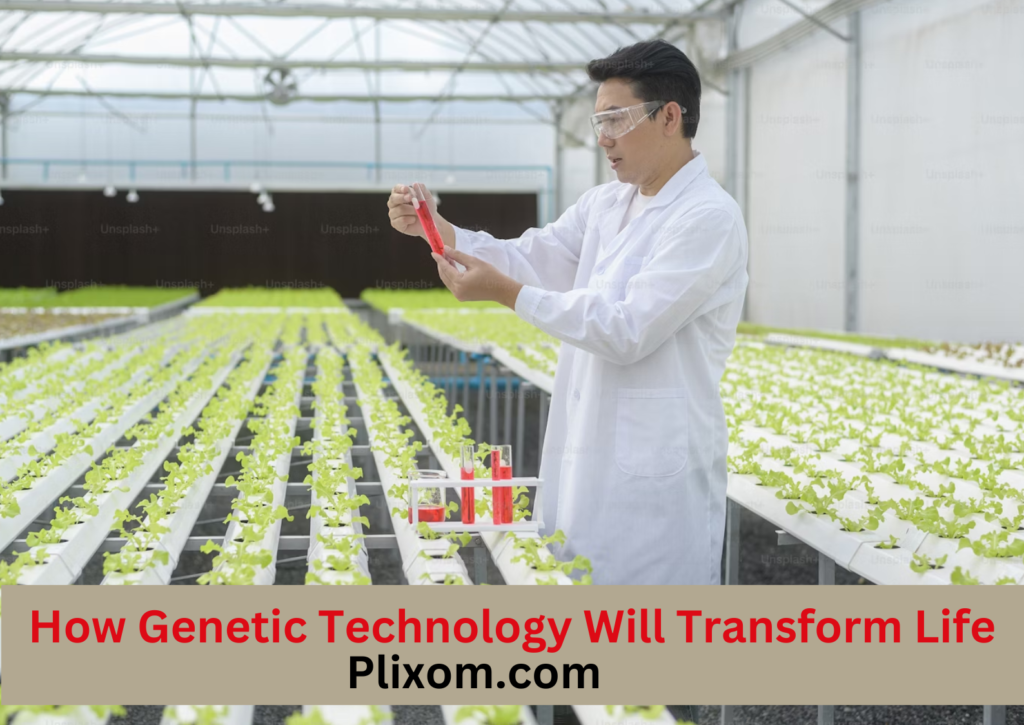Understanding Genetic Technology
What is Genetic Technology?
Genetic technology is a Special science that deals only with changing DNA, which stands for deoxyribonucleic acid. This is the code that defines who we are. It resides within every cell in our body. The technology lets scientists make changes to this code, commonly referred to as our genes or gene editing. This means that they are more of an instruction that genes are providing and which our cells put into action. The modifications or editing of such means of instruction, therefore, mean that these can change the way in which our body is designed to work.
How Does It Work?
Genetic technology is nothing but tampering with the code of DNA. For that, the scientist needs some tools. Maybe the most famous one among those is the CRISPR. It is like a pair of scissors that cut the DNA at a certain place. After that, bits of DNA can be added in, taken out, or changed. All this is what is collectively known as editing the genes.
This is a powerful new tool for a scientist, refined to make incredibly fine changes and elevate the level of change regarding a cell and its behavior. For example, in a gene whose function it is to bring the disease, the selectively engineered gene would be cut out, giving away the bad gene and the insertion of the good gene in the precise position targeted to cure it.
It is only now that scientists are starting to learn to incorporate this kind of genetic technology. This is, indeed, an extremely hard field. However, the possibilities are endless in this one. There is a huge number of impacts this genetic technology may have on the world.
Why Is It Important
Genetic technology is able to solve major problems, like diseases for which cures are not yet found. Food security can be realized in our country through it. Besides, it can also completely change the lifestyle and the attitude of a person toward the world around them.
This might help doctors with the medicine to cure diseases, increase better treatments, or even be preventive before they come. Stronger and nutritionally better crops can be biomechanically cultivated to feed more and make sure there are smaller numbers of hungry people in the world.
But, with power comes great responsibility. The potential that technology in genetics holds, while being hallooed for all that is good, needed to be ensured that a great many attendant ethical questions are adhered to. As such, the means of how this potential technology is utilized should make benefits gained from it inclusive in interest.
Probably the most exciting thing about genetic technology is the curing of diseases. Many types of diseases result from defective genes. These are genes that do not function properly. Now, doctors can correct these defective genes. That is called gene therapy.
Gene therapy is a replacement of a defective gene with a healthy one in order to be able to recover from the disease or make its severity less. Just like in some cancers, genes gone awry are the cause of a disease. For instance, doctors could change these genes so that the spreading of cancer was stopped.
As such, gene therapy is a relatively new field. Actually, it is not so much provided nowadays. But according to the screening in clinical trials, it shows excellent promise. Now, diseases that are currently incurable can be treated or even healed, from genetic disorders to cancer and some types of heart diseases.
Another important application of genetic engineering is in the area of personalized medicine. What it reall means is individualized care that one gets from a doctor; it just simply states that a doctor can offer treatment tailor made for you.
Indeed, within most hype about personalized medicine, genetic engineering underpins a lot of what can be deduced about health from one’s genes. One can always tell whether they are at risk of acquiring some diseases. They can know how a person might respond to different treatments.
The foretasted shall provide them the help they need in devising a treatment plan most suited for you. Meaning you can get the best care available. The treatment plans, when done specifically, are definitely more effective than the normal treatments. It will definitely enhance better results and fewer side effects.
Prevention of Diseases
The advances garnered in the field of genetics have their benefits in view of the fact how one’s illness can be foreseen or projected.
Another area in which genetic technology can be of use is in the field of preventive medicine. Physicians can now test for diseases you might be predisposed to contract based upon your genes; this process is known as genetic testing.
genetic engineering testing may let an individual know his predisposition to diseases such as cancer, heart diseases, or diabetes. A doctor will still arrive in time to prevent the person from developing the disease. For instance, in a case such that someone is at risk for breast cancer, they can begin to have mammography early. If one is at risk for heart disease, one may use cholesterol-lowering medications.
It is also far cheaper to prevent the disease than to treat the presence of the established illness. It may also save lives and hence be the saving of many a dollar when appropriate health care is handled. The prevention of so many diseases is now possible since genetic technology is available that can halt diseases before they even begin.
Changes in Agriculture
Better Crops
Farmers always want to have the best crops. They wish the crops to be strong, healthy, and to produce food in abundance. genetic engineering tends to make it therefore much easier. Better crops will be made with gen technology in a variety of ways.
For instance, they can come up with disease-resistant crops that will imply that the crops will never fall ill from a certain disease. Crops that grow fast or others that can do with much less water are very important to water-stress areas.
This way, improved crops guarantee more produce and could be a way to eradicate hunger from the earth. It also leaves the farmer in a position to live a better life. This, therefore, apparently proves that genetic technology indeed is a potent tool to be used in this fight against hunger.
Pest-resistant Plants
Among the major problems facing farmers today are insects. Insects are just creatures, and crop feeders. Such creatures can destroy nearly the whole of a crop within a few minutes of their action. Various pesticides have been applied by many farmers for centuries now. However, these chemicals are dangerous to the environment.
genetic engineering has better answers in its pouch. For instance, it is possible for scientists to make plants that pests do not like. That will mean the farmer will not use so much chemical. This in the final analysis is a good thing for the environment, and those consuming the food.
An addition, though, the most critical thing to notice about pest resistance in plants is that, with it, the farmers will have increased production of surplus food, even with lower resource inputs; hence, it is good for the earth and future generations.
More Nutrient Food
The genetic engineering improved food nutrients. They included more vitamins and minerals in crops in order to feed people. These are important things because people gained from it by offering healthful nutrients to the body to stay healthier.
For instance, in certain types of rice where scientists engineer and name them “Golden Rice,” more amounts of vitamin A are contained. This is very essential because the vast majority of people all over the world do not have enough supply of vitamin A. Vitamin A is very vital for the eyesight and immune system. Too much presence of it from Golden Rice prevents diseases associated with eyesight, blindness, and other diseases resulting from its deficiency.
More nutritious food will do much to fend off the malnutrition. genetic engineering can allow food to be produced that is both healthy, and at the same time, savors.
Genetic technology is such a development that is posing a threat to change the face of the world beyond recognition. It goes without saying that where there is a vast expanse of potential, of course, there comes a greater sense of responsibility. A lot of ethical questions crop up in the use of genetic technology.
By using these genetic technologies should human beings’ genes be regulated? This can all too easily lead to the creation of a designer baby, as some types of genes will have ultimately ended up being tampered with. Some are inclined to welcome this while the others feel that the slightest alteration of some genes in ovum is always morally wrong, no matter the intention is.
Another problem of ethics is who is going to decide what the genetic technology is going to be used for: the scientist, the government, or the people? For sure, these are huge decisions.
We should ensure that genetic engineering really works for all and does not hurt or exploit people. Some regulations and guidelines should be set regarding this, so that genetic technology is applied with some sense of responsibility.
As with all great tools, there must lie some risk in the genetic engineering technology. The alteration of genes could hold a risk of unintended side effects. Of course, sometimes the results may not be known until it is too late. This is the reason a lot of testing would be important before using this technology with anyone or anything alive.
This is a hazard since genetic changes can then be locked intergenerational into the future. Thus, a mistake done today would amount to tremendous impacts felt by the people in the future. Genetic technology is another risk that terrorists are said to apply in bioterrorism.
Scientists have to be very vigilant in their procedures of using genetic technology. They must consider every step ahead of them carefully for its long-term impacts. The benefits that it brings must be weighed against the possible risks that may result from it.
A New World
Yes, genetic technology will change life forever. It will touch on everything: medicine, food, and many others—interwoven in our future. Only, oppositely, it will have to be learned how to do it.
So, genetic technology is promising for a bright future through curing diseases, feeding the hungry, and bringing much more joy to our life. It brings challenges with itself, so we need to be prepared to face those challenges and to apply this genetic technology for benefiting from it.
We need a dialogue about the genetic technologies coming our way, an argument about the ethical problems and the risks, and under this virtue, join our efforts to define a future in which genetic technology works for the good of everyone.



